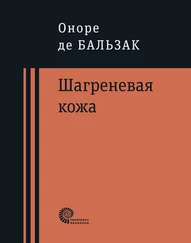| You have noticed, too, the large size and prominence of the liver. |
Вы заметили, как у него увеличена печень? |
| M. Bianchon has, besides, constantly watched the patient, and he tells us that digestion is troublesome and difficult. |
Наконец, господин Орас Бьяншон, наблюдавший за пищеварением у больного, сообщил нам, что оно проходит мучительно, с трудом. |
| Strictly speaking, there is no stomach left, and so the man has disappeared. |
Собственно говоря, желудка больше не существует; человека нет. |
| The brain is atrophied because the man digests no longer. |
Интеллект атрофирован, потому что человек более не переваривает пищи. |
| The progressive deterioration wrought in the epigastric region, the seat of vitality, has vitiated the whole system. |
Прогрессирующее перерождение надчревной области, этого жизненного центра, испортило всю систему. |
| Thence, by continuous fevered vibrations, the disorder has reached the brain by means of the nervous plexus, hence the excessive irritation in that organ. |
Отсюда постоянная и явная иррадиация; при посредстве нервного сплетения расстройство затронуло мозг, отсюда крайняя раздражительность этого органа. |
| There is monomania. |
Появилась мономания. |
| The patient is burdened with a fixed idea. |
У больного навязчивая идея. |
| That piece of skin really contracts, to his way of thinking; very likely it always has been as we have seen it; but whether it contracts or no, that thing is for him just like the fly that some Grand Vizier or other had on his nose. |
В его представлении шагреневая кожа действительно суживается, хотя, может быть, она всегда была такой, как мы ее сейчас видели; но сжимается она или нет, эта шагрень для него все равно что муха, которая сидела на носу у некоего великого визиря. |
| If you put leeches at once on the epigastrium, and reduce the irritation in that part, which is the very seat of man's life, and if you diet the patient, the monomania will leave him. |
Поставьте поскорее пиявки на надбрюшие, умерьте раздражительность этого органа, в котором заключен весь человек, заставьте больного придерживаться режима - и мономания пройдет. |
| I will say no more to Dr. Bianchon; he should be able to grasp the whole treatment as well as the details. |
На этом я заканчиваю. Доктор Бьяншон сам должен установить курс лечения в общем и в частностях. |
| There may be, perhaps, some complication of the disease-the bronchial tubes, possibly, may be also inflamed; but I believe that treatment for the intestinal organs is very much more important and necessary, and more urgently required than for the lungs. |
Возможно, болезнь осложнилась, возможно, дыхательные пути также раздражены, но я полагаю, что лечение кишечного тракта гораздо важнее, нужнее, неотложнее, чем лечение легких. |
| Persistent study of abstract matters, and certain violent passions, have induced serious disorders in that vital mechanism. However, we are in time to set these conditions right. Nothing is too seriously affected. |
Упорный труд над отвлеченными материями и некоторые бурные страсти произвели сильнейшее расстройство жизненного механизма; однако, чтобы исправить пружины, время еще не упущено, особо важных повреждений не наблюдается. |
| You will easily get your friend round again," he remarked to Bianchon. |
Итак, вы вполне можете спасти вашего друга, -заключил он, обращаясь к Бьяншону. |
| "Our learned colleague is taking the effect for the cause," Cameristus replied. |
- Наш ученый коллега принимает следствие за причину, - заговорил Камеристус. |
| "Yes, the changes that he has observed so keenly certainly exist in the patient; but it is not the stomach that, by degrees, has set up nervous action in the system, and so affected the brain, like a hole in a window pane spreading cracks round about it. |
- Да, изменения, прекрасно им наблюденные, действительно существуют у больного, но не от желудка постепенно возникло в организме это раздражение, идущее якобы по направлению к мозгу, как от трещины расходятся по стеклу лучи. |
| It took a blow of some kind to make a hole in the window; who gave the blow? |
Чтобы разбить окно, нужен был удар, а кто же его нанес? |
| Do we know that? |
Разве мы это знаем? |
| Have we investigated the patient's case sufficiently? |
Разве мы достаточно наблюдали больного? |
| Are we acquainted with all the events of his life? |
Разве нам известны все случаи из его жизни? |
| "The vital principle, gentlemen," he continued, "the Archeus of Van Helmont, is affected in his case-the very essence and centre of life is attacked. The divine spark, the transitory intelligence which holds the organism together, which is the source of the will, the inspiration of life, has ceased to regulate the daily phenomena of the mechanism and the functions of every organ; thence arise all the complications which my learned colleague has so thoroughly appreciated. |
Господа, у него поражен жизненный нерв - архея Ван-Гельмонта; жизненная сила повреждена в самой своей основе; божественная искра, посредствующий разум, который является как бы передаточным механизмом и который порождает волю, эту науку жизни, перестал регулировать повседневную работу организма и функции каждого органа в отдельности, - отсюда и все расстройства, справедливо отмеченные моим ученым собратом. |
| The epigastric region does not affect the brain but the brain affects the epigastric region. |
Движение шло не от надчревной области к мозгу, а от мозга к надчревной области. |
| No," he went on, vigorously slapping his chest, "no, I am not a stomach in the form of a man. |
Нет, - воскликнул он, бия себя в грудь, - нет, я не желудок, ставший человеком! |
| No, everything does not lie there. |
Нет, это еще не все. |
| I do not feel that I have the courage to say that if the epigastric region is in good order, everything else is in a like condition-- "We cannot trace," he went on more mildly, "to one physical cause the serious disturbances that supervene in this or that subject which has been dangerously attacked, nor submit them to a uniform treatment. |
Я не беру на себя смелость утверждать, что если у меня исправное надбрюшие, значит все остальное несущественно... Мы не можем, - более мягким тоном продолжал он, - объяснять одною и тою же физическою причиною сильные потрясения, в той или иной мере затрагивающие различных субъектов, и предписывать им одинаковый курс лечения. |
| No one man is like another. |
Люди не похожи друг на друга. |
| We have each peculiar organs, differently affected, diversely nourished, adapted to perform different functions, and to induce a condition necessary to the accomplishment of an order of things which is unknown to us. |
У каждого из нас имеются органы, по-разному возбуждаемые, по-разному питаемые, у которых может быть разное назначение и которые по-своему выполняют то, что им задано неведомым нам порядком вещей. |
| The sublime will has so wrought that a little portion of the great All is set within us to sustain the phenomena of living; in every man it formulates itself distinctly, making each, to all appearance, a separate individual, yet in one point co-existent with the infinite cause. |
Часть великого целого, предназначенная высшей волей к тому, чтобы производить и поддерживать в нас феномен одушевленности, в каждом человеке выражается по-разному и превращает его в существо, по видимости конечное, но в какой-то одной точке сосуществующее с причиною бесконечной. |


![Агата Кристи - На краю [английский и русский параллельные тексты]](/books/32247/agata-kristi-na-krayu-anglijskij-i-russkij-paralle-thumb.webp)
![Агата Кристи - Объявлено убийство [английский и русский параллельные тексты]](/books/33247/agata-kristi-obyavleno-ubijstvo-anglijskij-i-russ-thumb.webp)
![Фрэнсис Фицджеральд - По эту сторону рая [английский и русский параллельные тексты]](/books/34130/frensis-ficdzherald-po-etu-storonu-raya-anglijskij-thumb.webp)
![Роберт Шекли - Компания «Необузданные таланты» [английский и русский параллельные тексты]](/books/34808/robert-shekli-kompaniya-neobuzdannye-talanty-angl-thumb.webp)
![Уильям Макгиверн - Завтра опять неизвестность [английский и русский параллельные тексты]](/books/35168/uilyam-makgivern-zavtra-opyat-neizvestnost-angli-thumb.webp)
![Айрис Мердок - О приятных и праведных [английский и русский параллельные тексты]](/books/35170/ajris-merdok-o-priyatnyh-i-pravednyh-anglijskij-i-thumb.webp)
![Мэри Райнхарт - Альбом [английский и русский параллельные тексты]](/books/35200/meri-rajnhart-albom-anglijskij-i-russkij-paralle-thumb.webp)
